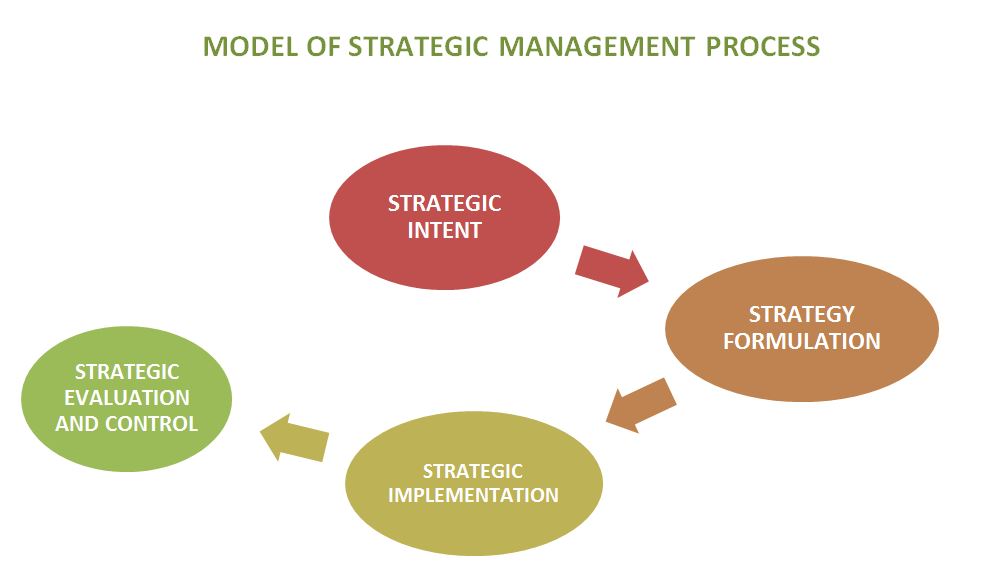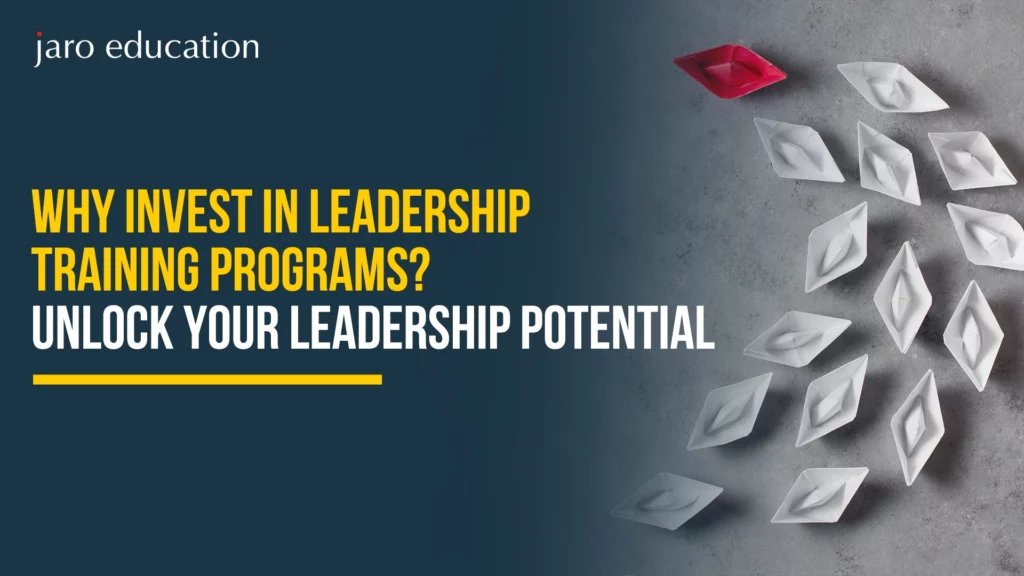Learn How Strategic Management Program Can Help Boost Your Career in 2024
Table of Contents

- jaro education
- 3, March 2024
- 2:00 pm
Strategic Management is all about developing the abilities that help a company provide value to customers, shareholders, and society while navigating competitive markets. It’s like a crucial tool used by managers to keep an eye on and control activities within their organization, making sure it achieves its goals. In 2024, businesses navigating complexities recognize the indispensable role of strategic thinking. It is the compass steering organizations towards goal-setting, informed decisions, and adaptability.
This guide unravels the profound impact of a Strategic Management Program on your career. You would explore the significance of strategic management, connecting its relevance to the contemporary business scenario. So, uncover the skills, insights, and opportunities that await as you navigate this enriching program, propelling yourself toward professional success and growth.
What is Strategic Management?
Strategic management is a comprehensive process that encompasses the development and execution of plans to propel an organization toward its goals. This entails formulating strategies, orchestrating organizational structure and resource allocation, spearheading change initiatives, and exercising control over processes and resources.
Strategic planning, a crucial component, involves identifying business challenges, selecting optimal strategies, monitoring progress, and adapting the executed strategy for enhanced performance. Tools like SWOT analysis play a pivotal role in evaluating strengths, weaknesses, opportunities, and threats within the organization, its competition, and the broader market.
This dynamic approach to strategic management operates at multiple levels, from organization-wide leadership to specific departments or teams. A continuous and adaptive process, it demands constant assessment and alignment to ensure organizational goals are effectively met. For those ready to deepen their strategic acumen, the “Executive Management Programme in Advanced Strategic Management” by CEP, IIT Delhi, serves as the ideal gateway to strategic excellence.
How Strategic Management Program Can You Help Boost Your Career
A Strategic Management Program is a structured and comprehensive initiative designed to equip individuals, teams, or organizations with the knowledge, skills, and tools necessary for effective strategic management. Such programs typically cover a range of topics related to developing, implementing, and evaluating strategies to achieve organizational goals. Key components of a Strategic Management Program may include:

*bbamantra.com
Strategic Planning
These programs profoundly enhance your strategic thinking and planning capabilities. It delves deep into strategic planning and environmental analysis, honing your skills in formulating long-term visions and setting actionable goals. You’ll learn to conduct thorough SWOT analyses, which are crucial for understanding both internal dynamics and external market forces.
These skills are invaluable in leadership roles where strategic direction is key. The program teaches you to not only set objectives but also to align them with your organization’s overarching goals. You’ll become adept at creating agile, executable plans, bridging current capabilities with future aspirations.
Environmental Analysis
Strategic Management Programs equip you with advanced techniques for conducting thorough environmental analysis, crucial in understanding the myriad of internal and external factors impacting an organization. Central to this is an in-depth exploration of SWOT analysis, a key tool for identifying an organization’s Strengths, Weaknesses, Opportunities, and Threats.
Internally, you’ll learn to assess the organization’s resources, processes, and dynamics, identifying areas to leverage strengths and improve weaknesses. This internal scrutiny is vital for enhancing operational efficiency and building a strong foundation for growth.
Externally, the program focuses on analyzing market trends, competitive landscapes, and socio-economic factors. You’ll develop the ability to evaluate how these elements might affect your organization’s strategy and operations, preparing you to navigate market changes, seize opportunities, and counteract threats.
Resource Allocation
Strategic Management Programs provide a focused approach to strategically allocate key resources – financial, human, and technological – ensuring they align with and support organizational objectives. This is essential for enhancing operational efficiency and achieving long-term success. Financially, you’ll learn effective budgeting, investment strategies, and cost management to maximize return on investment and maintain financial health.
This includes balancing short-term needs with long-term strategic objectives. In human resources, the focus is on optimizing workforce potential. You’ll acquire skills in strategic hiring, talent development, and performance management, ensuring the workforce is aligned with organizational goals.
Competitive Analysis Methods
You will be equipped with advanced methods for evaluating the competitive landscape and understanding industry dynamics, which are crucial for positioning your organization for a competitive advantage. You’ll delve into comprehensive market research and analysis, gaining insights into competitors’ strategies, strengths, and weaknesses and predicting their future actions.
Key to this is mastering models like Porter’s Five Forces, which assess the competitive intensity and attractiveness of your industry. This analysis covers supplier power, buyer power, the threat of new entrants, substitutes, and the level of rivalry among existing competitors.
Innovation and Creativity
Strategic Management Programs focus on instilling a culture where innovation and creative problem-solving are central and key to fostering adaptability and responsiveness in a rapidly changing business world. It teaches strategies to nurture an environment that encourages creative thinking and embraces innovative approaches.
You’ll learn how to promote a workplace atmosphere that welcomes new ideas and supports risk-taking. Apart from that, such programs emphasizes collaborative techniques like brainstorming and design thinking, which are instrumental in generating diverse perspectives and novel solutions.
Risk Management
In terms of risk management, teaching you to strategically identify, assess, and mitigate potential risks in today’s complex business environment. You’ll learn to recognize not just obvious risks but also those less apparent, covering financial, operational, technological, and market-related uncertainties.
Key to this is developing effective risk mitigation strategies. You’ll understand how to evaluate the likelihood and potential impact of risks and devise plans that reduce, transfer, or negate these risks to protect your organization.
Leadership Development
Strategic management programs emphasize developing leadership skills and instilling a strategic mindset in key personnel, crucial for effectively spearheading strategic initiatives. It transcends traditional management training by nurturing the qualities needed for visionary leadership in today’s complex business scenarios.
You’ll gain insights into inspiring and motivating teams, fostering innovation, and adeptly handling organizational changes. The focus is on enhancing critical thinking and decision-making abilities, enabling you to analyze complex situations, predict future challenges, and align decisions with strategic goals.
Communication and Collaboration
You’ll learn to tailor your communication to diverse internal audiences, ensuring clarity and impact. This includes mastering both verbal and non-verbal communication, and adeptly navigating digital communication channels. The objective is to make strategic messages resonate across the organization.
In terms of collaboration, the strategic management programs emphasize breaking down departmental silos and fostering cross-functional teamwork. You’ll discover ways to encourage productive team interactions, utilizing the varied skills and perspectives within the organization for enhanced problem-solving and innovation.
Performance Measurement
Strategic management programs equip you with the skills to establish effective performance measurement mechanisms, which are essential for evaluating and aligning organizational efforts with set objectives. You’ll delve into various frameworks and tools, learning to set relevant key performance indicators (KPIs) and track progress through data-driven approaches.
Critical analysis of performance data forms a core part of the curriculum. You’ll learn to discern trends and actionable insights, not just from quantitative metrics but also from qualitative aspects like customer satisfaction and employee engagement. This comprehensive evaluation is vital for informed decision-making.
Ethical and Responsible Business Practices
Strategic management programs focus on embedding ethics, sustainability, and social responsibility into the core of strategic decision-making. You’ll learn to go beyond mere legal compliance, embracing ethical principles that foster long-term business success and positive societal impact.
Exploring various ethical frameworks, you’ll understand how to navigate complex decision-making scenarios, considering the broader impact on stakeholders and the community. Sustainability is a key element, teaching you to develop strategies that balance economic growth with environmental care and social well-being.
Social responsibility is also emphasized, guiding you to engage in fair practices, contribute to community development, and align corporate actions with societal values. This comprehensive approach equips you to lead organizations that are not just financially successful but also champions of environmental stewardship and social responsibility.
1. Organizational Culture
Organizational culture plays a role in shaping strategic initiatives and nurturing a positive, adaptive workplace environment. You’ll delve into the components of organizational culture, including shared values, beliefs, and behaviors, and understand how they align with strategic goals.
Learning to identify and influence cultural elements is crucial for ensuring that organizational strategies are not just well-planned but culturally congruent. The program focuses on strategies to foster a culture that encourages innovation, collaboration, and flexibility, essential for adapting to market changes and challenges.
2. Change Management
Strategic management programs provide a holistic approach to managing and leading change within organizations, with a strong focus on the impact on employees and stakeholders. You’ll learn the intricacies of the change management process, including planning, communication, implementation, and evaluation.
Central to the curriculum is the development of a clear, strategic vision for change, coupled with effective communication techniques to ensure alignment and buy-in across the organization. Emphasizing empathetic leadership, the program teaches you how to address resistance, manage emotions, and foster a supportive environment that promotes adaptability and resilience.
Stakeholder management is another critical aspect, involving strategies for identifying key stakeholders, understanding their perspectives, and maintaining trust and transparency throughout the change process. By acquiring these skills, you’ll be adept at leading your organization through transformative changes, ensuring smooth transitions and the achievement of organizational objectives.
Strategic Management programs can be offered through various formats, including workshops, seminars, online courses, or executive education programs. They cater to individuals seeking to enhance their strategic management skills, as well as organizations looking to strengthen their overall strategic capabilities. The goal is to empower participants to navigate the complexities of the business environment, make informed decisions, and drive sustainable success. The Course by IIT Delhi – “Executive Management Programme in Advanced Strategic Management” is an exceptional opportunity and a top choice for strategic management in the market.
Participating in this executive course offers not just advanced knowledge and skills but also a valuable network of peers and a prestigious credential from IIT Delhi, renowned for its academic excellence.
Salary Outlook in Strategic Management Arena
As per Glassdoor insights gathered from 287 anonymous submissions, the average salary for a Strategy Manager stands at ₹22,35,358 per year in India. In addition to this base figure, Strategy Managers enjoy an average additional cash compensation of ₹3,00,000, with variations spanning from ₹2,00,000 to ₹5,00,000. These figures encapsulate the diverse earning potential within the role, reflecting the insights and experiences shared by professionals contributing to the dynamic field of strategic management in India.
Conclusion
A Strategic Management Program is more than just an educational course; it’s a catalyst for career transformation. By enhancing your strategic thinking, leadership skills, and industry knowledge, you position yourself as a valuable asset in any organization. As the business world continues to evolve, those equipped with strategic management expertise will lead the charge in driving innovation and success.
These programs can be offered through various formats, including workshops, seminars, online courses, or executive education programs. They cater to individuals seeking to enhance their strategic management skills, as well as organizations looking to strengthen their overall strategic capabilities. The goal is to empower participants to navigate the complexities of the business environment, make informed decisions, and drive sustainable success.






